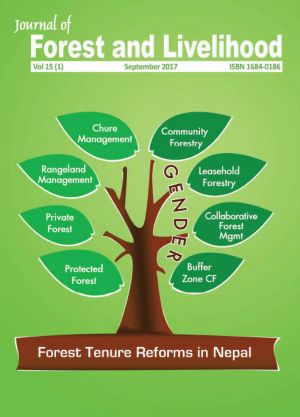Why Does Tenure Security Matter in Community Forestry? A Critical Reflection from Nepal
DOI:
https://doi.org/10.3126/jfl.v15i1.23082Keywords:
Community forest, decision making, livelihoods, resources, tenureAbstract
Nepal’s community forestry (CF) programme, which has been in place for over four decades and has rich lessons to offer beyond the national border, is the largest tenure reform initiative in Nepal. Tenure security is one of the primary requirements to unlock the ecological and economic potential of CF through the conservation, management, and utilisation of forest resources. Despite some gaps and issues in policy and practice, positive outcomes of CF have so far been reported. In this paper, we analyse CF tenure reform policy and practice. We find that forest-managing communities have been enjoying access, use, management, and exclusion rights over forest resources. However, communities are not able to tap the economic potential of local forests, partly due to limited opportunities available for commercial harvesting of forest resources and forest-based enterprise development. There is still a lack of institutional capacity among forestry stakeholders to harness the potential offered by changing policy at national and international levels, primarily due to ambiguities in forest carbon ownership and unclear cost and benefit sharing arrangements among different levels of government and community forest user groups (CFUGs). Addressing such issues to secure forest tenure and thereby realise the full potential of forest resources, both ecologically and economically, could be an area of future intervention, particularly in the context of changing national development policies and international environmental initiatives.
Downloads
Downloads
Published
How to Cite
Issue
Section
License
CC-BY-NC: This license allows reusers to distribute, remix, adapt, and build upon the material in any medium or format for noncommercial purposes only, and only so long as attribution is given to the creator.





